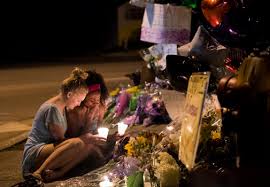
Our 4th of July flags were still flying high when seven people died leaving behind bereaved parents, children, relatives and friends. Families and friends from now on will have to celebrate births, confirmations, graduations, and marriages with tears, memories, and pictures.
The chronology of the tragic events took place in front of our eyes. In real time we saw Alton Sterling a black man shot and killed while pinned down on the ground by police officers in Baton Rouge America. On the scene was Muflahi the owner of the convenient store who kept repeating, “It was a nightmare,” contradicting the police version, “there was no altercation,” he said.
We watched as blood spread on the white shirt of 32-year-old Philando Castile shot by a police officer. The only sounds on the screen were the pleas of his girlfriend, Diamond Reynolds. She kept telling the police officer that Philando had complied and was trying to produce his documents. “He let the officer know that he had a firearm and he was reaching for his wallet and the officer just shot him in his arm.” In the backseat of the car her little four-year girl cried, “I am here.”
Watching life draining from Philando, Diamond begged him not to die. Pleading with police not to let him die. She was placed in the back of a police car. She was not allowed to comfort and hold the dying Philando. She wanted to know, where were first responders to stop the bleeding that took his soul away.
Two senseless deaths turned grief into anger at the pattern of blatant killing of black Americans by on-duty police officers. From the mountains, to the prairies, to the oceans white with foam, people came out to the streets of America to turn grief into political protest, demanding justice for the victims and an end to the killings, urging “black life matters.”
In Dallas Texas the protest was peaceful and as the crowd began to disperse and parents and children were heading home, rapid gunfire took down five police officers Brent Thompson Patrick Zamarripa Michael Krol, Lorne Ahrens, Michael Smith.
Moments earlier police officers had protected a demonstration protesting the killing of two black men. Suddenly attacked, they ran before our eyes into the raining bullets.
The killer a sniper, trapped, armed and dangerous spoke to negotiators of his rage that turned into violent deathly revenge. Dallas Police Chief David Brown announced several hours later that the sniper was killed by a robot in order to prevent more bloodshed. An emotional Brown said, “We are heartbroken. There are no words to describe the atrocity that occurred to our city. All I know is that this must stop, this divisiveness between our police and our citizens.”
We are trying to stitch together acrimony, accusations and grief over three violent deaths. Our thoughts have been with all mourners. Our hearts cry for all victims. We are also painfully aware of the divisiveness and the repeated tragedy of the killings of black citizens by police officers. A stunned Minnesota Governor Mark Dayton said what many of us have already known, that the police officer would not have shot and killed Philando Castile if he had been white.
The tragedies we witnessed are not, however, just about police behavior. They are symptoms of a fundamental fact of denying African American full citizenship rights. Full citizenship is granted to whites as a birthright and they are presumed innocent until proven guilty. Citizenship rights, however, are denied to blacks in daily life, and routinely. They are, a priori, presumed to be guilty of something. Their ascribed “guilt” is as amorphous as it is pervasive and made-up. They are conjured to be shoplifters in stores, thieves in affluent neighborhoods, muggers when they wear hoodies, cheaters when using food stamps, criminals when driving an expensive car.
Children in black families learn early on that they are not full citizens with equal rights in the eyes of the law. For them there is a separate and unequal early childhood education, an oral tradition of how to behave when stopped by police. The democratic rhetoric that police are there to protect all citizens does not translate to real black childhood experiences.
In our grief and mourning we can’t resort once again to the narrative of “bad apples” among police officers. The police are not some aliens who have come to live in our midst uninvited and causing trouble; they are Americans who live in this culture that far too long has been harboring a legacy of racism.
Our racism is a hand-me-down from slavery; it is rooted in the objectification of people as bodies to be treated with contempt, which has run through Jim Crow, and segregation de jure and de facto; always a hidden volcano right under our good earth of Civil Rights and “I have a dream,” and a twice-elected black president.
Now we must find our own way through grief and beyond mourning and that requires courage. We can move forward together if we have the courage to put an end to our legacy of racism and end our tale of two childhoods. This generation has the courage to say that black life matters, and together we can be free at last.